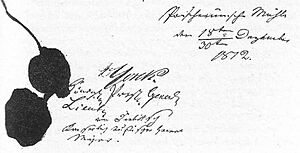Convention of Tauroggen facts for kids

The Convention of Tauroggen was a special agreement signed on December 30, 1812. It was like a ceasefire or a temporary peace deal. This agreement happened in a place called Tauroggen, which is now part of Lithuania. The agreement was made between General Ludwig Yorck von Wartenburg, who led Prussian troops, and General Hans Karl von Diebitsch from the Imperial Russian Army. Many people see Yorck's decision as a big turning point for Prussia. It helped start a fight against Napoleon and his French forces.
Contents
Why the Convention Happened
Prussia's Difficult Choice
In 1812, Prussia had to help Napoleon and his French army invade Russia. This was because of a treaty they had signed. Some Prussian soldiers didn't want to fight for the French. They even left their army. One famous person who did this was Carl von Clausewitz, who joined the Russian army instead.
General Yorck's Dilemma
General Yorck was in a tough spot. Between October and December, the Russians kept asking him to switch sides. He sent these messages to his king in Berlin, but he didn't get any instructions back.
Yorck's French commander, Marshal Étienne-Jacques-Joseph-Alexandre MacDonald, had to retreat from a battle. This left Yorck's Prussian troops all alone and surrounded by the Russians. As a soldier, Yorck's duty was to fight his way out. But as a loyal Prussian, he also wondered if this was the right time to start a "war of liberation" against Napoleon. He talked with Clausewitz about what to do.
Secret Talks and Decisions
While Yorck was talking with the Russians, he sent a message to Berlin. He wanted to let General Friedrich Wilhelm Freiherr von Bülow know about the possible truce with Russia. On December 29, Yorck's messenger told Bülow that Yorck had separated his troops from the French. He also said that an agreement with Russia was close. The messenger even suggested that the French should be treated as enemies.
At this time, the main French commanders were in Königsberg. The French commander, Joachim Murat, found out about Yorck's actions. He told Bülow that Yorck had "betrayed" them on January 1. Later that day, Yorck sent his own letter to Bülow.
What the Convention Said
The Convention of Tauroggen was signed by General Diebitsch and General Yorck. It made the Prussian army "neutral," meaning they wouldn't fight for or against anyone. Yorck did this without his king's permission. This agreement also left the border of East Prussia completely unprotected.
Prussia's Reaction
When people in Prussia heard the news, they were incredibly excited! But the Prussian king and his court were not ready to openly go against Napoleon yet. So, they sent an order to Yorck. It said he was removed from his command and would face a military trial.
However, General Diebitsch, the Russian commander, stopped the messenger from reaching Yorck. In the end, Yorck was forgiven for his actions. This happened when Prussia officially joined the Allies against Napoleon in a new agreement called the Treaty of Kalisz.
What Happened Next
Moving Troops and Supplies
Between January 1 and January 3, French commanders moved their headquarters. General Bülow worked very hard during this time. He moved his supplies to a place called Graudenz. He also moved about 5,000 of his soldiers to Kreuzberg. On January 9, Bülow moved his troops further west, giving up East Prussia to the French and the advancing Russians.
Yorck's Stand
On January 5, Yorck sent his last message to Berlin. On January 8, he arrived in Königsberg with the Russian general Ludwig Adolf von Wittgenstein. Yorck confirmed that he would stick to the armistice. However, he refused Wittgenstein's request to fight the French.
That same day, messengers from the king arrived. They told Yorck he was dismissed from his command and that his armistice was not approved. But Yorck refused to obey. In a letter to Bülow on January 13, he wrote about breaking "the chains of slavery." He said it was "the time to regain our freedom and honour." Yorck declared that he was "a true Prussian."
 | Charles R. Drew |
 | Benjamin Banneker |
 | Jane C. Wright |
 | Roger Arliner Young |

